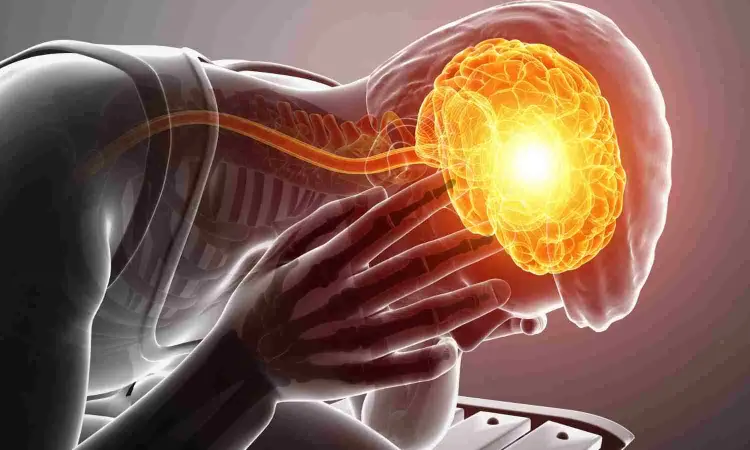- Home
- Medical news & Guidelines
- Anesthesiology
- Cardiology and CTVS
- Critical Care
- Dentistry
- Dermatology
- Diabetes and Endocrinology
- ENT
- Gastroenterology
- Medicine
- Nephrology
- Neurology
- Obstretics-Gynaecology
- Oncology
- Ophthalmology
- Orthopaedics
- Pediatrics-Neonatology
- Psychiatry
- Pulmonology
- Radiology
- Surgery
- Urology
- Laboratory Medicine
- Diet
- Nursing
- Paramedical
- Physiotherapy
- Health news
- Fact Check
- Bone Health Fact Check
- Brain Health Fact Check
- Cancer Related Fact Check
- Child Care Fact Check
- Dental and oral health fact check
- Diabetes and metabolic health fact check
- Diet and Nutrition Fact Check
- Eye and ENT Care Fact Check
- Fitness fact check
- Gut health fact check
- Heart health fact check
- Kidney health fact check
- Medical education fact check
- Men's health fact check
- Respiratory fact check
- Skin and hair care fact check
- Vaccine and Immunization fact check
- Women's health fact check
- AYUSH
- State News
- Andaman and Nicobar Islands
- Andhra Pradesh
- Arunachal Pradesh
- Assam
- Bihar
- Chandigarh
- Chattisgarh
- Dadra and Nagar Haveli
- Daman and Diu
- Delhi
- Goa
- Gujarat
- Haryana
- Himachal Pradesh
- Jammu & Kashmir
- Jharkhand
- Karnataka
- Kerala
- Ladakh
- Lakshadweep
- Madhya Pradesh
- Maharashtra
- Manipur
- Meghalaya
- Mizoram
- Nagaland
- Odisha
- Puducherry
- Punjab
- Rajasthan
- Sikkim
- Tamil Nadu
- Telangana
- Tripura
- Uttar Pradesh
- Uttrakhand
- West Bengal
- Medical Education
- Industry
Can we predict when a migraine attack will occur?

Migraine is often underdiagnosed and untreated, and even when it is treated, it can be difficult to treat early enough as well as find strategies to prevent attacks. A new study looks at ways to more accurately predict when a migraine will occur-through the use of mobile apps to track sleep, energy, emotions and stress-to enhance the ability to prevent attacks. The study is published in the January 24, 2024, online issue of Neurology®, the medical journal of the American Academy of Neurology.
The study found that poor perceived sleep quality as well as a lower than usual quality of sleep on the prior night were both associated with an increased risk of having a migraine the next morning. A lower than usual energy level the prior day was also associated with headache the next morning. Those factors did not lead to an increased risk of migraine in the afternoon or evening. The only predictors of an afternoon or evening headache were increased stress levels or having higher-than-average energy the day before.
“These different patterns of predictors of morning and later-day headaches highlight the role of the circadian rhythms in headache,” said study author Kathleen R. Merikangas, PhD, of the National Institute of Mental Health, part of the National Institutes of Health in Bethesda, Maryland. “The findings may give us insight into the processes underlying migraine and help us improve treatment and prevention.”
The study involved 477 people ages 7 through 84, including 291 female participants. Through a mobile app, participants were asked to rate their mood, energy, stress, and headaches four times a day for two weeks. They also rated their sleep quality once a day and wore sleep and physical activity monitors. Nearly half of the participants had a history of migraine and 59% had at least one morning headache attack during the study.
People with poorer perceived sleep quality on average had a 22% increased chance of a headache attack the next morning. A decrease in the self-reported usual quality of sleep was also associated with an 18% increased chance of a headache attack the next morning. Likewise, a decrease in the usual level of energy on the prior day was associated with a 16% greater chance of headache the next morning. In contrast, greater average levels of stress and substantially higher energy than usual the day before was associated with a 17% increased chance of headache on the following afternoon or evening. After considering sleep, energy and stress, neither anxious nor depressed mood were associated with headache attacks.
“Surprisingly, we found no link between a person’s anxiety and depression symptoms-either having more symptoms or having higher-than-average levels of symptoms-NeurologyNeurologyand their likelihood of having a migraine attack the next day,” Merikangas said. “Perhaps most interesting, headaches were associated with self-rated sleep quality rather than actual measures of sleep patterns. This highlights the importance of perceived physical and emotional states in the underlying causes of migraine.”
“Our study demonstrates the importance of monitoring sleep changes as a predictor of headache attacks,” said study author Tarannum M. Lateef, MD, of the Children’s National Health System in Washington, D.C. “The use of apps that track sleep and other health, behavioral and emotional states in real time can provide valuable information that can help us to manage migraine.”
Reference:
Tarannum M. Lateef, MD, MPH, Debangan Dey, PhD https://orcid.org/0000-0002-2579-5693, Andrew Leroux, PhD, Lihong Cui, MSc, Mike Xiao, BS, Vadim Zipunnikov, PhD, and Kathleen R. Merikangas, Association Between Electronic Diary–Rated Sleep, Mood, Energy, and Stress With Incident Headache in a Community-Based Sample, Neurology, https://doi.org/10.1212/WNL.0000000000208102.
Dr Kamal Kant Kohli-MBBS, DTCD- a chest specialist with more than 30 years of practice and a flair for writing clinical articles, Dr Kamal Kant Kohli joined Medical Dialogues as a Chief Editor of Medical News. Besides writing articles, as an editor, he proofreads and verifies all the medical content published on Medical Dialogues including those coming from journals, studies,medical conferences,guidelines etc. Email: drkohli@medicaldialogues.in. Contact no. 011-43720751


